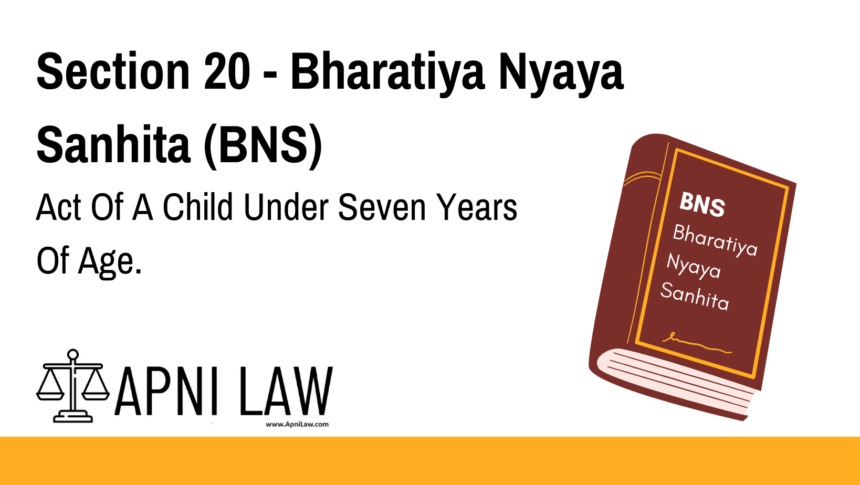Code: Section 20 BNS
Section 20 – Bharatiya Nyaya Sanhita (BNS) – Act of a Child Under Seven Years of Age
Nothing is an offence which is done by a child under seven years of age.
Explanation of Section 20 BNS
1. What Does Section 20 BNS Mean?
Section 20 of the Bharatiya Nyaya Sanhita (BNS) provides that a child under seven years of age cannot be held criminally liable for any act they commit. This is based on the legal doctrine of “Doli Incapax”, which means incapable of forming criminal intent.
✔️ Lack of Criminal Intent – A child under seven cannot understand that their actions are illegal.
✔️ No Legal Punishment – Since intent is crucial in crime, the law does not hold them responsible.
✔️ Age-Based Protection – If the child is under seven at the time of the act, they are exempt from prosecution.
Illustrations & Examples
Example 1: A Child Breaks Someone’s Phone
A six-year-old child accidentally drops and breaks a stranger’s phone while playing.
✅ Legal Verdict: The child cannot be punished, as they did not have criminal intent.
Example 2: A Child Takes Money From a Wallet
A five-year-old takes money from his father’s wallet to buy chocolates.
✅ Legal Verdict: The child is not guilty of theft because they do not understand ownership laws.
Example 3: A Child Pushes Another Child in Anger
A four-year-old pushes another child in frustration, causing minor injury.
✅ Legal Verdict: The act does not qualify as an offence under the law, as the child does not understand the legal consequences.
Common Questions About Section 20 BNS
1. Can a child under seven be arrested for a crime?
🚫 No. Children under seven cannot be arrested, prosecuted, or punished for any offence.
2. What if a child under seven commits a serious crime like murder?
Even in extreme cases, the child cannot be held criminally responsible. However:
- The authorities may counsel the parents and monitor the child’s behavior.
- Juvenile justice laws may come into effect if required for the child’s protection.
3. Can the parents of the child be punished?
❌ Parents cannot be criminally liable, but they may have to compensate for damages caused by the child.
4. What if a child turns seven after committing the offence?
The law considers the age at the time of the act. If the child was under seven when the act occurred, Section 20 BNS still protects them.
Conclusion
Section 20 BNS is a crucial law that protects young children from criminal prosecution by acknowledging their lack of understanding and intent. Instead of punishment, the focus remains on guidance, education, and parental responsibility.
For more legal insights, visit ApniLaw today! 🚀








